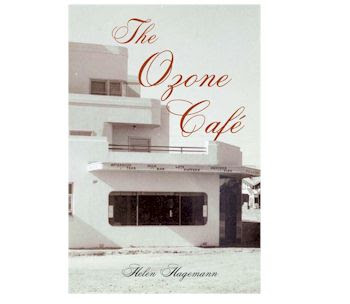 |
| click on pic |
Helen Hagemann reviews Terra Bravura by Meredith Wattison
When
receiving poetry collections for review, I generally research online to find
other reviews in order to gauge that particular reader’s response. In this
instance I was not disappointed to find several written by most noteworthy
academics, including Edric Mesmer from the University of Buffalo USA, and
Antonia Pont a Senior Lecturer in Literary Studies and Professional &
Creative Writing at Deakin University.
Both writers appraised the work in an in-depth, contemporary and erudite
way. Pont felt obligated as a reviewer
to mine the work for its narrative / aesthetic arc and themes, while Mesmer
explored its tethering muliebrity. Muliebrity! Wattison’s word in her
description of 1950s women. (32)
While I agree with other reviewers that Terra Bravura is a difficult book to
read (perhaps it’s the esoteric phraseology), I tend to explore the poetry from
the personal point of view (the lyric ‘I’) often looking for a grassroots, emotional
engagement. As I wended my way through its rather dense 140 pages, Wattison’s epilogue on the last page caught my eye.
Whether this is a single poem or an addendum to the work, it does not matter. Here
is a charitable look at an aging father with dementia that we come to know in this
family auto/ biography in verse.
I show him photographs I have had made from
some of his slides. He doesn’t recognise my mother on a beach from their
honeymoon, but then the placename brings forward a memory of being there, years
earlier, and watching a nudist, wearing only a towel draped around her neck,
walk from her cottage every morning down onto the beach for a swim, then she’d
walk back. ‘You could set your watch by her,’ he says, grinning.
Lately he has begun to wake distressed,
looking for ‘it’ – ‘Where is it?’ He doesn’t know what ‘it’ is. Only that it is
lost.
Only that it is lost and also there, like a
woman walking and melting into the sea, at regular intervals, 60 years ago, and
now, with fondness. (136)
Poets and their fathers have been a major
connecting subject in poetry from Seamus Heaney, e e cummings, Robert Bly, Robert
Burns, and César Vallejo, to name just a few. Poems about fathers by their poet
daughters are even more interesting and Freudian linked. Anne Sexton’s poem ‘Daddy’ Warbucks reveals a subliminal subservience
to a powerful father, while Sylvia
Plath’s Daddy reveals the father as a
vampire and a Nazi who tortures and attacks her individuality. Gale Swiontkowski
in her study of Sexton and Plath writes that both poets use the word ‘Daddy’ as
opposed to ‘Father’ to show a familiar affection and need, while undermining and
challenging the patriarchal and hierarchal structure of ‘Father’ as head of the
household. In the Oedipal dilemma, both daughters are ‘compelled to defer their
position as victim to escape the subordinate role…as with their enduring
mothers.’(27-28). It is through poetry that Sexton and Plath form a controlled
and creative response to the affluent and powerful, but destructive and
predatory father. (29)
Wattison’s
poetry, although a dense and obscure narrative, nevertheless deals in part with
the archetypal relationship of father and daughter. For the purpose of
empowering, not victimizing herself, Wattison moves away from confessional
poetry towards the symbolic and if not actual, to an equality of father and
daughter through the mystical power of poetic language – ‘I do
not tire of this combative bloom….he tilts at the enemy/ I am not it.’
(38-39).
There
is a candid nothing of our dynamic.
We
are graduating foreground
to
a flowering azalea. (115)
…
The
father-eating folktale
is
a solarised crop
of
subject and infinity. (116)
…
This
time he waves
as
I appear through the gate
as
though I wouldn’t see him,
a
fluttering poplar, standing
in
the garage,
Ach,
du, Daddy (119) after Sylvia Plath’s ‘Daddy’






































